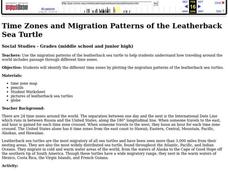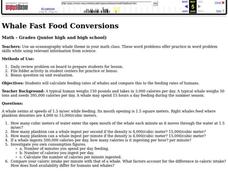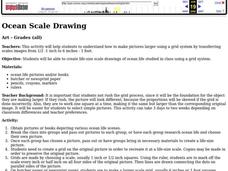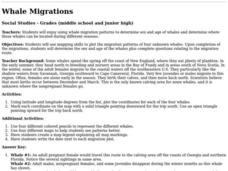Curated OER
SUBMARINE MOUNTAINS
Students create a two-dimensional contour map of a submerged area from a simulated survey using sounding techniques.
Curated OER
Building A Topographic Model
Students visualize, in three dimensions, features represented by contour lines on a topographic map. They see that the different elevations shown on a two dimensional topographic map can be used to build a 3-D model.
Curated OER
Time Zones and Migration Patterns of the Leatherback Sea Turtle
Students identify the different time zones by plotting the migration patterns of the leatherback sea turtles. They discover that traveling around the worlds includes passage through different time zones.
Curated OER
Heat Flow
Pupils explore how a whale's countercurrent flow of blood is an example of a heat exchange system and conduction. Excellent worksheet provided.
Curated OER
PASSWORD VOCABULARY REVIEW
Young scholars write definitions for vocabulary words used in a unit in any subject area. They use the words to play a game.
Curated OER
Sea Connections
Students, after locating different marine habitats on a globe, play a card game about ecosystems, food webs and organisms.
Curated OER
Salt Water Wedge
Students conduct an experiment to observe the properties of both salt and freshwater. They explain why freshwater will stay at the surface while salt water will travel up a river bottom because of density. Students also research the...
Curated OER
Antarctica
Learners explore why Antarctica is so important to the planet. They investigate the physical characteristics. Students create their own unique treaty of governance for Antarctica and discuss how laws are enforced in Antarctica.
Curated OER
Writing about the climate
Students research the contributing factors to the Earth's paleoclimate. They determine the relevant climate data and use it to construct a science argument. In the process, they access data, capture images of the data plots, and...
Curated OER
Bank On It! Antarctica
In this vocabulary worksheet, students read an informational paragraph about Antarctica. Students then fill in the 17 blanks with words from the word bank.
Curated OER
Whale Fast Food Conversions
Students calculate feeding rates of whales and compare this to the feeding rates of humans.
Curated OER
Writing about the world's fisheries (Calibrated Peer Review)
Students summarize the findings of the Pew Ocean Commission report "America's Living Oceans," contrast it to an opposing viewpoint, and recommend a fisheries policy based on their understanding. It includes a scoresheet that was created...
Curated OER
Ocean Scale Drawing
Students explain how to make pictures larger using a grid system by transferring scales images from 1/2 -1 inch to 6 inches - 1 foot. They create life-size scale drawings of ocean life studied in class using a grid system.
Curated OER
Cetacean or Fish?
Students cut out pictures from magazines of fish and cetaceans. They make a creative bulletin board labeling their pictures and identifying different features.
Curated OER
Water Pressure - Observing Water Flow
Pupils discover that pressure increases the deeper the ocean becomes. They determine how water pressure differs at various depths by observing water flow.
Curated OER
Create an Underwater Scene
Students apply knowledge of underwater ocean life by creating an ocean life scene with marine animals and plants placed at appropriate ocean depths.
Curated OER
Swim Like a Whale or Fish?
Students recognize the difference between whales and fish by categorizing them according to their method of swimming. They synthesize this information by simulating the swimming patterns of whales and fish and comparing it to their own.
Curated OER
Whale Migrations
Young scholars use whale migration patterns to determine sex and age of whales and determine where these whales can be located during different seasons. They use mapping skills to plot the migration patterns of four unknown whales.
Curated OER
Water Density and Stability Lab
Students observe how different water densities and salinity control the depth at which different water masses occur. Submarines are used as a case study. This is a well-designed with an excellent worksheet.
Curated OER
Beach Zonation
Students identify and separate the different zones of the beach by observation. They investigate beach zonation by gathering and comparing sand samples gathered from different areas of the beach.
Curated OER
Pipeline to the Coral Reefs
Students discuss the relationship of density to stratification. In this marine science instructional activity, students create a model of upwelling events using cold and warm water. They discuss how water phenomena affect coral reefs.
Curated OER
Global Warming Is Human Made
In this environmental awareness worksheet, students read an article about the causes of global warming. Students then answer seven true or false questions, 10 10 synonym matching questions, and ten phrase matching questions based on the...
Curated OER
Measuring Aquatic pH
Students apply the scientific method and safety rules to aquatic pH. They test unknown solutions for pH levels.
Curated OER
Sharks and Fishes
Students explain the role of the school of fish as the prey and the shark as the predator, as they participate in the game Sharks and Fishes. They demonstrate quick physical movement, and trickery, by sucessfully staying away from the...

























